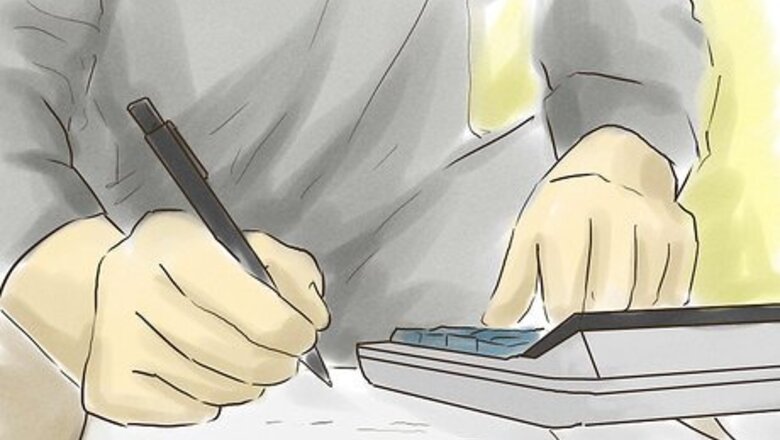
views
Getting to Grips With Your Debts
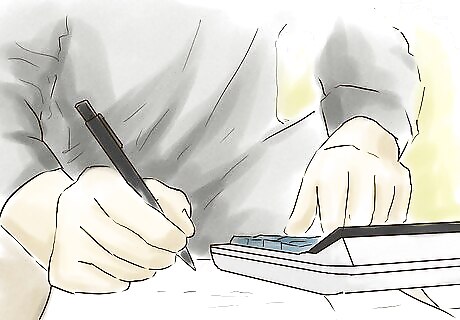
Evaluate the situation. The first step to getting to grips with your debt problem is to conduct an honest appraisal of all your outstanding debts, and the amount they are costing you. Start by writing down every single debt you have, and try to include as much information as possible. You can’t make any progress until you have a clear picture of your financial situation. Note down the key information, including interest rates, the principal amount, the monthly payments, and any collateral pledged to secure the loan. This could be a stressful and difficult experience, but it’s essential that you do it. Once you have all this information at hand you can begin to understand it and chart a path forward.

Determine your secured and unsecured debts. Once you have drawn up a list of all of your debts, you need to make some judgements about which debts are most important and most pressing. Start by determining which of your debts are secured and which and unsecured. This is important, because it shows you which debts could lead to you quickly losing property, such as your home. Secured debts are those which are tied to a particular asset, such as your home or your car. If you default on your payments, the debt holder can foreclose on the collateral pledged to secure a loan. Unsecured debts are those which are not tied to an asset, and generally include things like credit card debts, medical insurance bills, and signature loans.
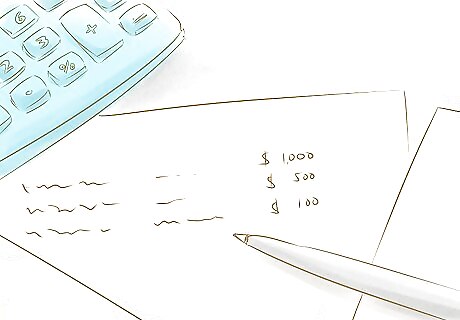
Prioritize your debts. The next step is to go through your outstanding debts and prioritize them. Although all your debts are important, some are more important than others. The most important ones are generally those which could lead to you losing assets such as your home, automobile, and other physical property. These debts can include any rent you owe, mortgage payments, council or state taxes, and utility bills you have not paid. Rent and utility becomes debts when you fall behind on the payments. These can lead to you being cut off from utilities and losing your home, so should be treated as a priority. Lower priority debts include credit card bills, some installment debt or rent-to-own arrangements, bank overdrafts, loans from relatives, or other unsecured debts. When you are prioritizing your debts, look at those that have the highest interest rates. If you can pay off debts which have higher interest rates quickly than you will be freeing yourself of these costs, and giving yourself a better chance to deal with your other debts. If you have any savings, use these to pay off expensive debt. The interest you will be charged on debt will be higher than what you can earn on your savings. However, be cautious not to spend all of your savings, since this would use up emergency funds that might be needed in the future. It is common for companies that hold lower priority debts to be more aggressive in their collection practices, so be aware of this and maintain your focus on the higher priority debts.

Establish whether or not you are in debt crisis. When you have worked out all of your debts, you need to make an early judgement as to how severe your debt problem is. There is no fixed definition of “debt crisis,” but to try and figure out your position, ask yourself two questions. Firstly, are you struggling to pay basic expenses to cover your debts? This could be mortgage repayments, credit card minimums and utility bills. Then ask yourself if your debts (excluding your mortgage and car loan payments) are bigger than a year’s income after tax. If the answer to either of these questions is yes, then your debt problem could be quite severe and you should make an appointment with a not-for-profit debt or credit counsellor immediately. Remember that however big your debts are, the important things is whether or not you’re able to service them.

Don’t take out more expensive loans. For many, indebtedness can become a never-ending cycle, which gets worse over time. Often if you have a number of expensive loans, you may be pressured or encouraged to take out more loans to pay off the existing ones. This is particularly common with payday loan companies, and you should avoid adding more expensive debt at all times. In some cases it may be possible to get a cheap loan with low rates from a credit union. This could help you to pay off expensive debt and replace it with debt that is affordable. Before you do this, talk to an independent credit counsellor. Be wary of debt consolidation loans. These loans may require you to put your house up as collateral and offer no guarantees. However, a debt consolidation loan can be advantageous if you work with a reputable lender and can get a lower interest rate than you are currently paying. Just be careful to not take on any additional debt after consolidating.
Plotting a Route Forward
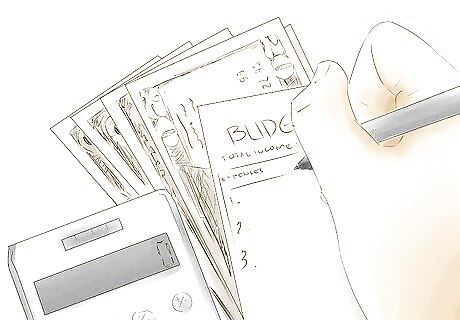
Develop a budget. Once you have a clear picture of all your debts, the next step is to work out how much you can afford to pay each month. Draw up a detailed budget that covers all of your income and expenses and determine what money you have available for your debts. Think about how you can reduce your expenses by making savings and cutting back on non-essentials. If possible, consider how you might also raise your income. Once you have your budget, you should be able to come up with a realistic and attainable figure that you can set aside each month just for paying off your debts. Join this up to your list of prioritized debts and see how much you can afford to pay.

Contact your creditors. Now you need to contact your creditors to talk about possible ways to restructure and reorganize your debts. If you are able to give them detailed information about how much you are able to pay each month, it may be possible to renegotiate the terms of your loans. For example, you may be able to agree a new repayment plan that reduces the monthly amount you pay, but spreads the payments out over an extended period. It’s important that you are able to reach an agreement with your most troublesome creditors. The others should be easier to pay off once you take care of these creditors and reduce your payments to them.

Access credit counseling. If you have been unable to negotiate new repayment plans, or all of the information is overwhelming you, be sure to make an appointment with a non-profit credit counseling or debt advice organization. There are number of charities and other non-profits that specialize in giving free and impartial advice to people who find themselves in financial difficulty. Here you will receive advice on what steps to take, and how to deal with creditors. There is lots of useful information online, but always try to get a face-to-face meeting. Lots of universities, military bases, and branches of the U.S. Cooperative Extensive service have non-profit credit counseling schemes. Local credit unions, Citizen’s Advice Bureaux, and housing authorities may be able to help. Make sure you are visiting a reputable organization with a strong track record. Non-profit doesn’t always mean free.

Consider a debt management plan. In some cases, a credit counsellor may suggest you enroll in a debt management plan. The counsellor is most likely to suggest this if you are unable to repay your debts. The plans typically involve you paying money to the counseling organization, who then pay it to your various unsecured debts. Think carefully about this and be sure you have talked it through with your creditors. Only do this if an advisor has looked through your finances thoroughly. In most instances, a counsellor should be able to give you advice on budgeting and managing your debts without resorting to one of these plans.
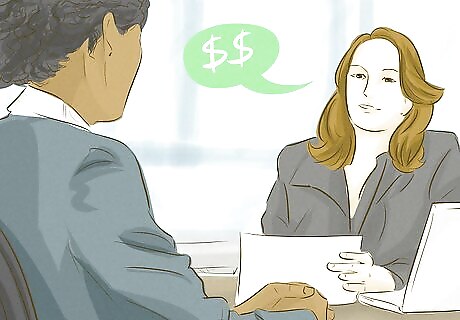
Try debt settlement. Debt settlement programs involve working with a company (normally a for-profit company) to pay off principal balances to your creditors, with lump sums that are less than what is owed. Creditors will only do this if they believe it's a better outcome than trying to chase you for payments in the future. The company will make the payment, but you will be required to pay a specific amount of money into a savings account for a long time. This can help pay off your debts, but it can be a risky approach. If you consider this, be sure you that can make the monthly payments indefinitely. Bear in mind your creditors are under no obligation to come to terms with the debt settlement company. Debt settlement companies generally encourage you to pay them rather than your creditors. As a result, your credit score will suffer and there can be other consequences. If your debts are not being paid you may be incurring extra fees and charges that you wouldn’t if you were paying the creditor directly. There are numerous scams related to debt settlement, and not all companies will live up to their promises. Before you sign-up, do plenty of research on the company and always get free impartial advice for a non-profit credit counseling organization.

Investigate debt consolidation. You may be able to lower the cost of your debt by consolidating it against a new line of credit, such as by re-mortgaging your home. These plans will generally use your home as collateral, so if your home is not at risk from your debts, think carefully about whether you want to put it on the line. Be wary of consolidation schemes with variable rates. What might be cheaper to start with can become more expensive if the rate is pushed up.
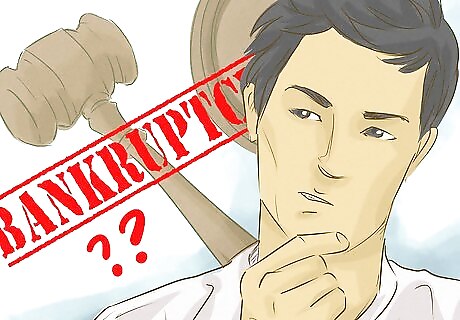
Consider bankruptcy. If your debts are completely unworkable and you cannot find a way forward, it might be time to consider filing for bankruptcy. This is a major decision with long-lasting consequences that should not be taken lightly. Bankruptcy can make it very difficult to access credit or buy a home in the future. Those filing for bankruptcy can file for either Chapter 7 or Chapter 13 bankruptcy. Chapter 7 is simpler and faster to file and results in the elimination of most debts, but some filers may not qualify for this type of bankruptcy. Bankruptcy should be considered as a last resort in most cases. In some circumstances, bankruptcy can give a person a fresh start. Talk through your options in detail with a credit counsellor and an attorney specializing in bankruptcy and credit problems before taking any decisions.
Dealing With Debt Emotionally
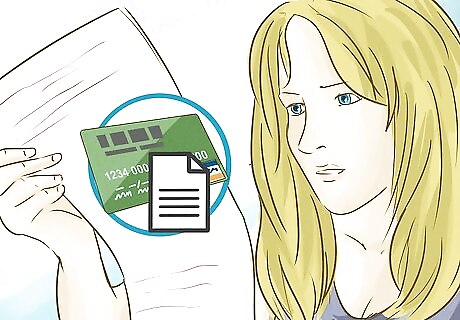
Acknowledge your debt problem. A common reaction to even severe debt is to go into denial about the seriousness of the situation. Debt can be an intensely difficult thing to deal with emotionally, but it’s essential that you acknowledge the situation and the impact it is having on you. There is an increasing amount of evidence that shows the impact of indebtedness on stress and mental health, so this isn’t something you should ignore. Being in denial about your debt can make the situation worse and delay your reaction. Don’t wait for a major event, such as a foreclosure notice, to acknowledge your debt problems.

Talk to someone about your debt stress. Indebtedness can have a huge toll on you psychologically, so try and talk to someone about your situation. Talking to friends or family may be difficult, so seek the help of a therapist if your debt stress is really causing you problems. This is an important part of acknowledging the situation. Only once you have acknowledged your financial situation will you be able to take the necessary next steps to deal with it. Always seek impartial advice from a credit counsellor, but don’t neglect the psychological impact of debt.

Take steps to feeling more positive. It’s completely normal to be anxious and stressed about a difficult financial situation, but you can take steps to help you to feel more positive. Of course dealing with the debt and finding a way forward financially is essential, but you can also try to improve your mood. This may even help you to deal with the debt and focus on finding a route forward. Try to be active. Exercise lots, but also spend time with friends and doing everyday tasks. Face your fears by getting some debt advice and coming to terms with the problem. Try not to drink too much. Some people use alcohol to cope with stress and anxiety, but drinking could add to your problems.

Know when to get help. If your feelings or stress and anxiety don’t alleviate, and these feelings are starting to have an impact on your ability to live your life, you should make an appointment with your doctor. If your negative feelings persist for weeks, you doctor may recommend you see a therapist for more support. If you feel like you really can’t cope emotionally, or that life is not worth living, get help immediately. Don’t let the situation deteriorate. Contact your doctor or call a telephone helpline.















Comments
0 comment